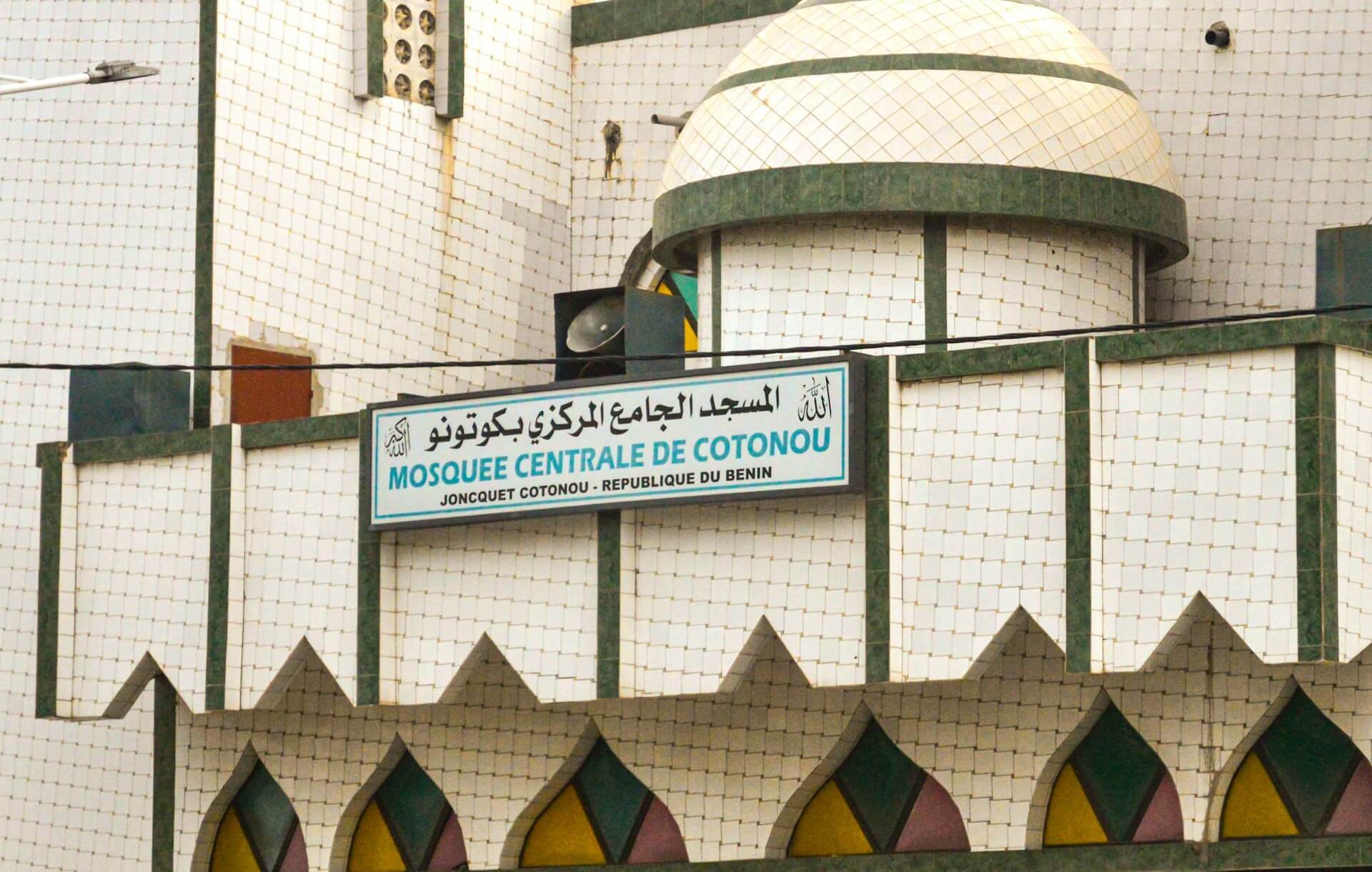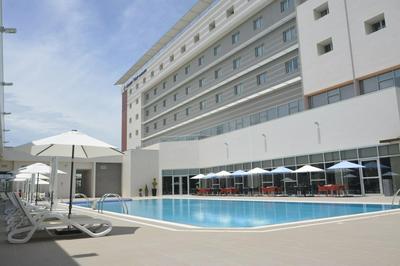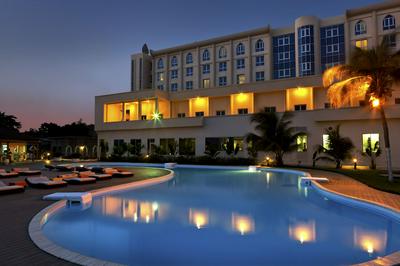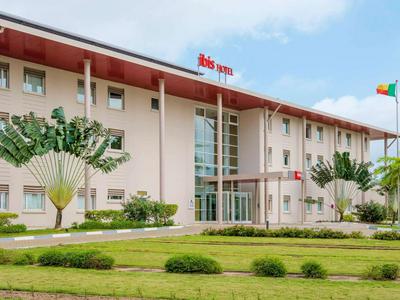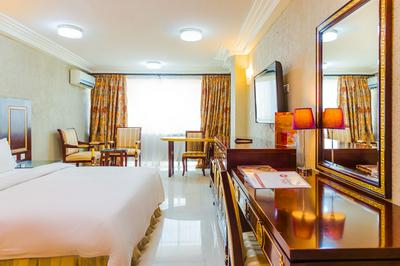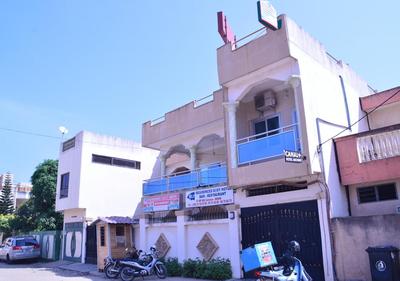When to visit Cotonou?
Cotonou, the vibrant economic capital of Benin, experiences a tropical climate characterized by two main seasons: the dry season and the rainy season. The dry season typically runs from November to March, making it the best time to visit. During these months, temperatures range from 25°C to 32°C (77°F to 90°F), and the weather is relatively pleasant, perfect for outdoor exploration and cultural activities. With low humidity and ample sunshine, visitors can enjoy attractions without the interruption of rain.
The rainy season takes over from April to October, with the heaviest rainfall occurring between June and September. While the landscape turns lush and vibrant, the high humidity and occasional torrential downpours can disrupt travel plans. However, those willing to brave the rain may find fewer tourists and a more authentically local experience.
Spring (March to May) sees an increase in humidity as the rainy season approaches, while autumn (September to November) presents a much cooler and comfortable period. Summer months (June to August) can be extremely hot and humid, but the vibrant local life goes on as usual. Regardless of when you decide to visit, Cotonou has a certain charm that captivates every traveler.
How to get to Cotonou?
Cotonou is well-connected and easily accessible from various parts of the world. The main gateway is Cotonou International Airport (COO), located about 5 kilometers from the city center. Regular flights connect Cotonou to major cities in West Africa as well as Europe, with airlines offering both direct and connecting routes. Once you arrive, various transportation options, including taxis and shuttle services, can get you to your accommodation promptly.
For those traveling by land, long-distance buses operate routes from neighboring countries such as Nigeria and Togo. These buses offer a budget-friendly way to enter Benin, with services frequently departing from major cities like Lagos and Lomé. You can expect travel times of around 2 to 3 hours, depending on border crossing times and traffic conditions.
While there are no trains directly into Cotonou, once in the country, you can opt for local minibuses or shared taxis to navigate between cities and towns. For complete flexibility, renting a car is also a viable option, especially if you plan on exploring the beautiful surrounding regions. Just keep in mind that road conditions can vary, so a little patience is often necessary.
Tourist activities in Cotonou
Cotonou presents a fascinating blend of cultural, historical, and recreational activities that cater to diverse interests. Begin your exploration with the vibrant markets, such as Dantokpa Market, one of the largest in West Africa. Here, you can browse a myriad of stalls selling spices, textiles, and handmade crafts. Don't forget to practice your bargaining skills!
For history enthusiasts, a visit to the Fondation Zinsou, an art foundation showcasing contemporary African art, will be worthwhile. You can immerse yourself in the local culture and even engage in workshops and events hosted by local artists. Additionally, the Cotonou Museum of History and Culture is essential for those keen on learning about Benin's rich heritage.
Outdoor activities are also popular, with several parks and green spaces available for relaxation, such as the serene Place des Martyrs. For families, the nearby beaches like Fidjrossè Beach offer fun under the sun, including opportunities for beach volleyball and fresh seafood from local vendors. As night falls, the city transforms with bustling nightlife along Rue de la Marina, where you can find lively bars and music venues to unwind after a day of exploration!
Events and festivals
Cotonou boasts a lively cultural calendar filled with vibrant events and festivals throughout the year. One of the most celebrated events is the Voodoo Festival, held every January, which showcases the rich Voodoo culture of Benin, featuring rituals, vibrant costumes, and traditional dances at Ouidah, not far from Cotonou.
In February, the Cotonou International Film Festival brings filmmakers and film lovers together to celebrate cinematography from across Africa. Screenings, workshops, and discussions provide insights into the African film industry while promoting local talent.
The month of August sees the famous Festa di Ouassou, a captivating music festival celebrating the diverse musical heritage of Benin with performances from local artists and international acts, filling the city with beats of Afrobeats, traditional melodies, and contemporary sounds.
This festival not only highlights the rich historical background of the country but also promotes local businesses and artists, making it a delightful experience for locals and visitors alike.
Family and kids activities
Cotonou offers numerous activities that are perfect for families traveling with children. One of the top spots is the Benin Zoo at the Parc Zoologique de Cotonou, where kids can encounter various animal species native to the region in a safe environment. The zoo is well-maintained, providing educational information about wildlife while ensuring fun and engagement for young visitors.
Another great option is the lagune beaches, especially Fidjrossè Beach, which is known for its safe swimming conditions and shallow waters — ideal for kids to frolic in the sea. Families can also engage in various watersports and beach games to keep the excitement alive!
The Cotonou Botanical Gardens is another lovely destination for a relaxing outing, featuring lush greenery and picnic areas, making it a perfect spot for parents to unwind while children explore nature. Additionally, the vibrant markets of Cotonou can be entertaining for children, who will delight in seeing colorful handicrafts and local foods.
Finally, consider cultural experiences such as visiting the Ouidah Museum of History, which caters to family-friendly activities while educating young minds about Benin's history. With so much diversity in activities, Cotonou is sure to provide unforgettable memories for families!
What to see in Cotonou?
Cotonou is filled with remarkable sights and attractions that capture the essence of Benin's rich culture and history. Begin your journey at the Cotonou Cathedral, a stunning architectural piece that depicts the craftsmanship of local artisans and serves as a spiritual hub for many.
- Cotonou Cathedral: Famous for its unique architecture, this cathedral is a landmark that showcases the beautiful craftsmanship of local materials.
- Dantokpa Market: One of Africa's largest outdoor markets, offering a plethora of local products, from fresh produce to vibrant textiles.
- Fondation Zinsou: An art foundation emphasizing contemporary African artistry—don’t miss the exhibitions!
- Place des Martyrs: A historical square hosting monuments that commemorate those who fought for the independence of Benin.
- Ouidah Museum of History: Located close by, this museum provides insight into the rich cultural heritage and Voodoo history of the region.
- Fidjrossè Beach: A popular beach spot perfect for relaxation and enjoying water activities.
Cotonou also brims with neighborhoods each displaying unique characteristics. Whether you're wandering the bustling streets of the city center or relaxing by the coast, Cotonou has a blend of sights that cater to every traveler's interests.
Accommodation in Cotonou
Cotonou offers a diverse range of accommodation options to suit every budget and preference. You can find luxury hotels along the coast, providing stunning sea views and upscale amenities. For instance, the Azalaï Hotel and Golden Tulip offer comfortable lodging with pools, restaurants, and convenient access to local attractions.
Mid-range choices, such as Hôtel Le Bénin or Hotel Atlantis, provide a pleasant atmosphere without breaking the bank, with cozy rooms and helpful staff. These hotels are ideally located near shopping areas and cultural sites.
For the budget-conscious traveler, Cotonou's hostels and guesthouses present excellent value. Places like Maison de la Culture are great for those looking for a more local experience and an opportunity to meet fellow travelers.
When it comes to neighborhoods, consider staying near the waterfront if you want to enjoy the beach, or in the lively city center which is close to markets, restaurants, and entertainment zones. Each area has its charm, and choosing the right spot will ensure a fantastic stay while exploring the enchanting city of Cotonou!
Important numbers and information
- Emergency Numbers: Police: 117, Fire: 18, Ambulance: 2222-0000
- Tourist Information Centers: Cotonou Tourist Office - Avenue Jean Paul II
- Main Hospitals: CHU-Hôpital de Cotonou, Clinique Saint Jean
- Airport Contacts: Cotonou Airport: +229 21 35 52 82
- Public Transport Information: Local Buses and shared taxis frequently operate around the city
- Taxi Apps: Uber is available, along with local options such as Togo Taxi
- Currency: West African CFA Franc (XOF)
- Payment Methods: Credit cards accepted in larger establishments; cash is preferred at markets and smaller shops.
Where to eat?
Cotonou offers a delightful culinary journey influenced by local ingredients and flavors. You cannot visit without trying traditional dishes such as 'pounded yam with vegetable sauce' or 'akara' (bean cakes) served with spicy pepper sauce. Local eateries often serve these beloved staples at affordable prices.
For a more upscale dining experience, head to Le Fanal, an established restaurant known for its sophisticated atmosphere and a diverse menu featuring both local and international dishes. Seafood lovers should not miss restaurants like La Plage, where fresh catches from the Atlantic are masterfully prepared.
If you're in the mood for street food, wandering through Dantokpa Market presents ample opportunities to sample quick bites, from skewered meat to fufu and plantains—all bursting with flavor! The average price for a meal in Cotonou ranges from 1,500 CFA Francs (about $3) at a local eatery to over 10,000 CFA Francs ($20) for more sophisticated dining.
Dine like a local and savor the vibrant culinary scene that Cotonou has to offer!
Nightlife – where to go out?
Cotonou’s nightlife is as vibrant as its culture, with various options for evening entertainment. Begin your night at Le Monde Café, a trendy bar known for its lively atmosphere and signature cocktails; it’s a popular spot among locals and expats alike. The relaxed vibe makes it a great place to unwind after a day of sightseeing.
If you’re in the mood for dancing, head over to Atlantis Le Club, where you can enjoy electrifying beats from local DJs while mingling with a fun crowd. The establishment is known for its themed nights and events that keep the energy high.
For a more laid-back experience, check out the local bars along Rue de la Marina. Places like La Paillotte offer a coastal view and live music on weekends, making it a perfect spot to celebrate life with friends.
The nightlife in Cotonou reflects its diverse culture and is a great way to connect with the local community while enjoying music, delicious drinks, and good company!
Transport and taxis
Navigating Cotonou can be an enjoyable experience, thanks to various public transport options available. Shared taxis, known as 'zémidjans,' are popular among locals and offer a unique way to explore the city. These informal taxis operate along designated routes, and you can catch one easily by waving at the driver. Fares are generally inexpensive, often costing around 200 CFA Francs for short distances.
Public buses are also available, providing an economical way to traverse the city. They typically run every 30 minutes, with fares ranging from 100 CFA Francs to 300 CFA Francs depending on the distance. Note that public transport can be crowded during peak hours, so plan accordingly.
Taxis can be summoned through apps like Uber, providing an excellent alternative for those who prefer convenience. Ensure to confirm the fare beforehand, as it may vary drastically.
- Transport Apps: Uber (available), local taxi apps like Togo Taxi
- Shared Taxis: Easily found around the city; fares are inexpensive
- Public Buses: Affordable and run regularly; best for short distances
- Safety Tips: Agree on fares in advance for taxis, especially with local cabs
Parking and public garages
Parking in Cotonou is relatively straightforward but comes with some considerations. The city has various parking zones, primarily concentrated around shopping districts and popular attractions. Street parking is available, but it's wise to pay attention to signage indicating restrictions or fees.
Public garages can be found near major commercial centers, albeit at a cost that typically ranges from 200 to 500 CFA Francs per hour. Ensure to keep your valuables out of sight while parked, as safety can occasionally be a concern.
For those planning to rent a car, note that driving styles may differ from what you are accustomed to, including a mix of traffic regulations. It's recommended to park in well-lit areas, especially at night, and look for accommodations that offer parking facilities for added convenience.
Surroundings of Cotonou
The surroundings of Cotonou are brimming with natural beauty and cultural landmarks, perfect for day trips. Just a short drive away is the historical city of Ouidah, renowned for its rich history linked to the transatlantic slave trade. Here, you can explore the Python Temple and the Ouidah Museum of History, immersing yourself in the region's heritage.
For nature lovers, head to the protected area of Porto-Novo, home to a rich diversity of flora and fauna. The German Fort and the Royal Palace are interesting stops to enjoy the vibrant atmosphere of Portugal’s colonial architecture and history.
Another spectacular location is Lake Nokoué. Here you can take boat rides to visit the unique stilt villages, providing a glimpse into the traditional lifestyles of local communities.
Exploring these nearby destinations not only enriches your travel experience but also allows you to appreciate the stunning landscapes and cultural richness that surrounds Cotonou.
